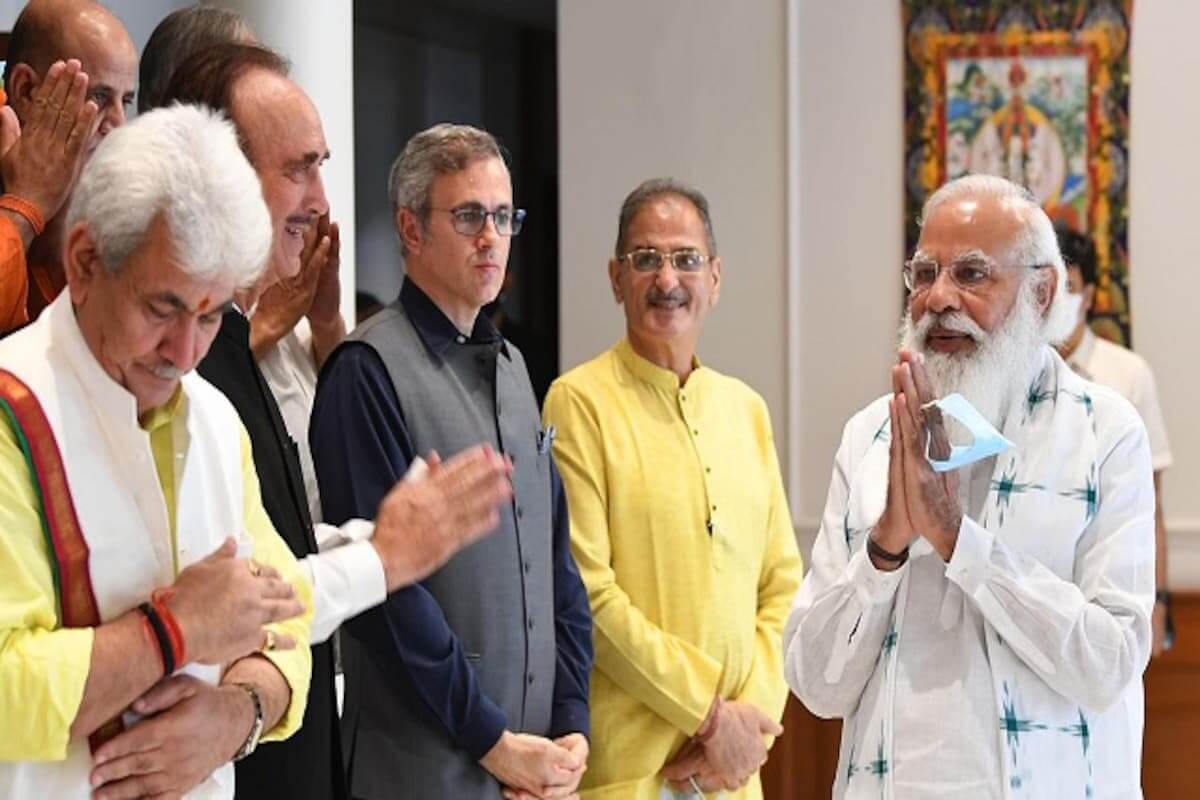Indian Prime Minister Narendra Modi concluded an All-Party Meet with 14 political leaders from Jammu and Kashmir (J&K) in New Delhi on Thursday, the first such meeting since the Centre repealed Article 370 of the Constitution and abrogated the special status enjoyed by the erstwhile state in August 2019. The discussions were attended by senior Indian officials, including Home Minister Amit Shah and National Security Adviser Ajit Doval, as well as several prominent leaders of the Union Territory (UT), including Farooq Abdullah, Ghulam Nabi Azad, Mehbooba Mufti, and Omar Abdullah.
Today’s meeting with political leaders from Jammu and Kashmir is an important step in the ongoing efforts towards a developed and progressive J&K, where all-round growth is furthered. pic.twitter.com/SjwvSv3HIp
— Narendra Modi (@narendramodi) June 24, 2021
According to a statement released by the Ministry of Home Affairs, the leaders conducted “detailed deliberations on how to give further fillip to the democratic process in Jammu & Kashmir.” PM Modi also stressed the need to “strengthen grassroots democracy” in the UT and expedite delimitation to pave the way for local elections. Home Minister Amit Shah echoed this sentiment, saying that “the delimitation exercise and peaceful elections” were critical to restore J&K’s statehood.
PM Modi also urged the erstwhile state’s leaders to participate in the delimitation exercise, which is being led by the Delimitation Commission. The Commission was set up to increase the number of assembly constituencies in the UT from 107 to 114.
However, political leaders of J&K have previously raised concerns that increasing the number of constituencies would “alter the unique demographic balance of the Union Territory.” During the meeting, National Conference (NC) Vice-president Omar Abdullah reiterated this belief, saying that “singling out” Jammu and Kashmir for the process of delimitation has raised “a lot of suspicion” among residents. He said this resulted from the “trust deficit” between the Centre and the region’s people following the Modi-led government’s decision to repeal J&K’s special status.
During the four-hour-long discussions, the Union Territory’s leaders raised several concerns. To begin with, Mehbooba Mufti, the former Chief Minister and the Vice-president of the Gupkar Alliance, called the decision to revoke the special status of J&K “unconstitutional and immoral.” She added, “Article 370 was not given to us by Pakistan. It was incorporated into the Constitution by Jawaharlal Nehru and Sardar Vallabhbhai Patel. Whether it takes months or years, we will strive to get it back.” This sentiment was resonated by Omar Abdullah, who said, “Making J&K a Union Territory is not acceptable to the people of Jammu and Kashmir region. We want complete statehood with the restoration of independent cadre for J&K.”
Moreover, during a media briefing following the discussions, Congress leader Ghulam Nabi Azad said he communicated five key demands to the Central leaders. Firstly, he called for immediate restoration of statehood in Kashmir, which he mentioned was promised in the Parliament. He added that it was a favourable time to reinstate statehood in light of the ceasefire with Pakistan and the overall improving situation in the Union Territory. Secondly, he demanded that assembly elections in Jammu and Kashmir be conducted expeditiously. Thirdly, he called for efforts to be made for the successful return and rehabilitation of Kashmiri Pandits, which he said was the “moral responsibility” of leaders. Fourthly, Azad urged the Central government to release all social and pollical prisoners detained or arrested following the abrogation of Article 370. Lastly, he demanded land rights, jobs, and the protection of domiciles in Jammu and Kashmir.
Meanwhile, the Pakistani Chairperson of the Parliamentary Committee of Kashmir, Shehryar Khan, criticised the meeting, saying that it was merely a discussion with the Indian government’s “own agents” portrayed as “Kashmiri leadership.” “It is a situation where Delhi is talking to Delhi,” he added.
The All-Party Meet was held amid heightened tensions in the region. On Wednesday, authorities in the region imposed a 48-hour high alert following a sudden surge in violent attacks on security personnel. In Modi’s Bharatiya Janata Party’s stronghold, Jammu, several protests broke out, with demonstrators burning effigies of Mehbooba Mufti and chanting anti-Pakistan slogans.
While there is a long path ahead to combat the trust deficit that continues to exist between the leaders and residents of the Union Territory and the Central government, opening dialogue is being viewed as a positive step towards reconciliation.

